Tucked behind New Lane in West Tisbury lies Flat Point Farm, marked by a weathered, hand-painted sign of grazing sheep, the abutting Tisbury Great Pond, and gathering clouds. Turning in, a muddy finger of the brackish water appears, and just beyond, the original farmhouse, long past its heyday. You can hear the sixty-plus laying and guinea hens that Eleanor (Fischer) Neubert tends.
This is not a glam farm with fencing à la the Ponderosa. The hand-cut posts are irregular, bent, and mostly lichen-covered after years, probably decades, of holding in livestock. The barn, now nearly eighty years old, shows both its age and the sturdy craftsmanship that still protects the farm animals and hay. It was built by the late Hariph Hancock, the legendary builder and father of Herbert Hancock, another legendary Chilmark builder now gone. The sheds and chicken coop on one side, hayfield on the other, are kept company by various tools, tractors, attachments, a couple of misplaced powerboats sitting idly on trailers, and some old metal wheel spokes that would probably fetch a good price on eBay. In short, there’s a wonderful, random clutter in the barnyard.
No. Flat Point Farm is a working family farm started by Arnold “Arnie” M. Fischer Sr. in 1939 and carried on today primarily by the families of two of his five children, Arnie Jr., who is sixty-two, and Eleanor, seventy-one. It began with dairy cows and switched over to beef cattle and sheep, which still roam the two fenced fields, one north, one south. The hayfield has been the most reliable moneymaker over the decades, but even folding in the income in recent years from renting the peninsula’s open field for a very occasional wedding or two, there’s always been the need for a second or even third side gig, both on and off the farm.
When Arnie Sr. bought the land for $3,500 near the end of the Great Depression, most people thought he was a tad daft. There was a farmhouse on it, but the land was largely scrubby woodlands and brush bordering Tisbury Great Pond. Arnie Sr. wanted room to farm, however. With his father, Albert O. Fischer Sr., he had kept cows at Pilot Hill and near Turtle Pond in Vineyard Haven. So he ignored the doubters and marched the cattle up from Vineyard Haven along what was then a dirt-covered Old County Road and down New Lane to the newly acquired and named Flat Point Farm.
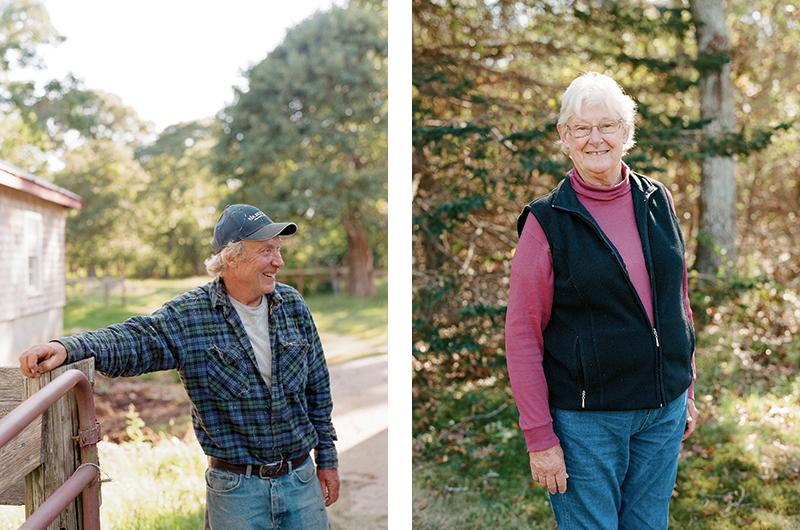
For twenty-five years Flat Point was a successful dairy farm. Arnie Sr. was a leader in establishing the Martha’s Vineyard Cooperative Dairy in 1946. The Vineyard Gazette heralded its success in 1956: “Here it is today, one of the major accomplishments in the modern history of Martha’s Vineyard, a vital foundation stone in the Island’s economy, and clear evidence that men of good will and sufficient knowledge can work together successfully in a common cause.”
A cooperative system of processing and distributing milk from Island cows supported a thriving dairy industry here until government regulations and cheap, mass-produced milk from the mainland forced its closure in 1963. Not long after, Arnie Sr. sold his dairy cows, turned to beef cattle and sheep, and took another job banging nails.
His wife, Priscilla, was a waitress at Havenside in Vineyard Haven when she met her future husband on his milk delivery run one July day. They married that November of 1945 and Priscilla taught until her retirement as the West Tisbury School principal in 1976. In other words, she too always had another job, even with five kids to care for – the four girls grouped together, and then the surprise of a boy, Arnie Jr.
In 1981 Arnie Sr. told the Gazette, “I like to grow things. Vegetables, animals. Try to improve the land, leave it in better condition than I found it.” He died in 1998, and Priscilla followed in 2012.
To his son, Arnie Jr. – who along with his wife, Christa, and his sister Eleanor gradually took over the hayfields, chickens, sheep, and beef cattle operations at the farm – the 1960s marked the low point for agriculture on the Vineyard. “There was no farmers’ market and no ‘let’s buy local’ mentality,” he recalled. “The farm has been a blessing and a curse. I’ve been so fortunate to live my life here. I just wish I had come up with a way to make it more profitable.”
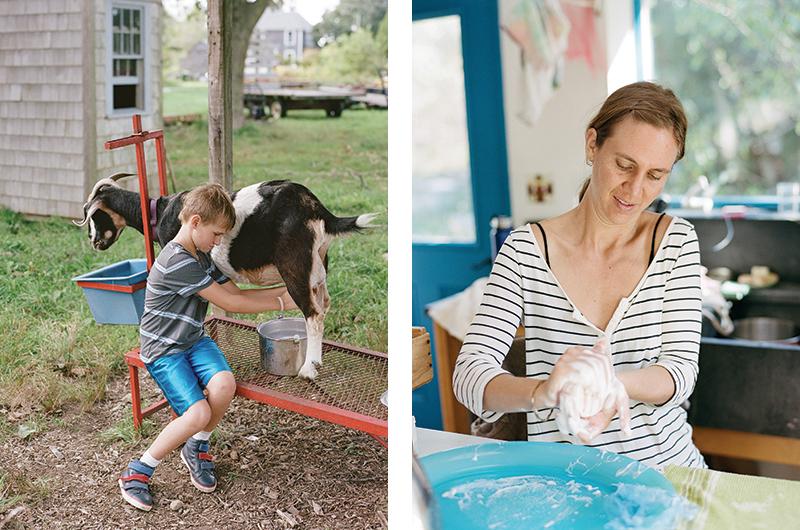
Things began to change in 1974 with the introduction of the West Tisbury Farmers’ Market. Today, the thriving market jams the town center Saturday and Wednesday mornings in the summer. Coupled with a farm-to-table movement that advocates locally produced food and fish for restaurant menus and school lunches, Arnie Jr. is optimistic. “Today,” he said, “there are good things and good signs everywhere. There are land trusts and The Trustees of Reservations, and there’s more and more private money to protect the land. And all of it has meant agriculture is doing better on the Vineyard and in Massachusetts than at any other point in my lifetime.”
Which is not to say that breaking even on a farm is anything but a moving target. After thirty years during which selling hay kept the farm largely in the black, the back-to-back drought summers of 2015 and 2016 struck. That’s when, Arnie Jr. said, “We made an effort to sell more meat.”
Like their parents, both siblings of the second generation found that maintaining Flat Point Farm and raising families required that they chart second careers. Arnie Jr. has operated Moonlight Gardening, a landscaping and caretaking business, for the last forty years. Eleanor initially taught kindergarten in Oak Bluffs and stopped after daughter Sarah was born. Stopped, that is, until she returned as a teacher’s assistant for another thirty-eight years at the Chilmark School. She retired in 2017. And, of course, she served as the well-known matron and conductor of the Martha’s Vineyard Agricultural Fair.
“For the first three years I said, ‘I’m never going to do this again,’” said Eleanor, looking back on her early fair years. But she stayed, built a crew of regulars, and kept running the fair for thirty-four years. This past August marked the first fair opening not in her charge since 1984.
Sitting on her couch, she reminisced with her younger sister, Jean Fischer O’Reilly, who was visiting the family farm from Ohio. Jean has made the pilgrimage virtually every year since she married Tim O’Reilly, the candy salesman from off-Island who came monthly to Alley’s General Store in West Tisbury where she and Eleanor worked the counter. The two sisters sometimes checked one another’s cloudy memory as they recalled the good fortune that has allowed their own children and grandchildren to know this farm.
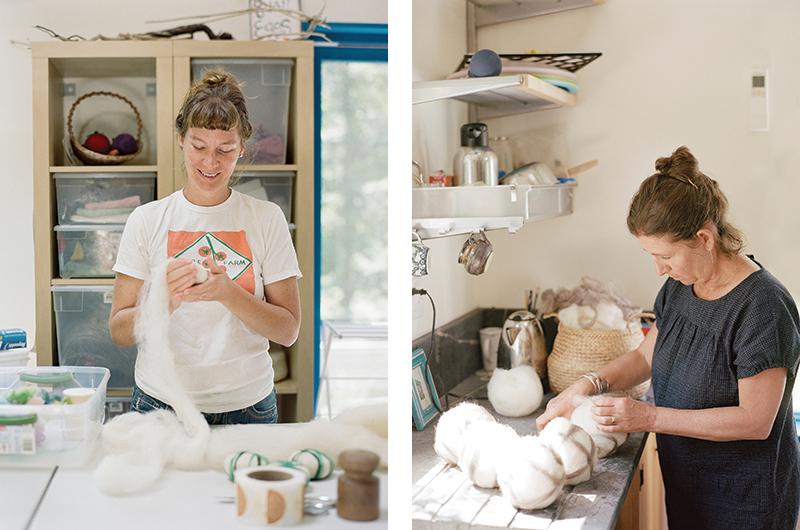
“We’ve lost two sisters,” said Jean, thinking of Nancy, who died in a plane crash in 1973, and Mary, who died in 2015. “And we know how lucky we are. Lucky to have been born here of all the places in the world.”
“We all had a lot of chores, but we really didn’t consider them chores,” added Eleanor, who was the only one of the four Fischer girls who ever considered staying and farming. “We had barn cats and a golden retriever, and there were always puppies and kittens, and we kids all had pet bantam chickens and rabbits too. We really didn’t know any different life. It was normal for us, but at some point in school in Vineyard Haven, there were kids who didn’t look upon us so well. It was like, ‘Who are these farmers from up-Island?’”
As it was with the second generation of Fischers on Flat Point, so it is with the third. Arnie Jr. and Christa’s daughter Emily didn’t initially envision returning to the family farm. But after she and her husband, Doug Brush, worked for a sheep and dairy farm in New York, and spent some time in Providence, they plotted a return. They developed a business plan for making and selling goat cheese, but when the start-up costs went north of sixty grand, they thought again. They still make cheese for the family, but most of the goats’ milk goes into soap making, a simpler enterprise and production without reams of government regulations associated with producing food. The beautiful round soaps are meticulously wrapped in colored paper or in felted wool that’s made from the sheep and dyed by her mother. Emily, in fact, credits Christa with being the true craftsperson in the operation.
The first batch of soap was sold to Morning Glory Farm for retail, but the real launch came at the farmers’ market nine years ago. Since then sales of Flat Point Farm soaps have increased 20 to 30 percent each year. There’s an online ordering option on the farm website (flatpointfarm.com), an Etsy site, the mainstay farmers’ markets, multiple Vineyard retail outlets, and a couple of mainland outlets too. “I could spend a lot more time in my lonely studio making more soap with NPR on if I wanted to,” she said as she wrapped soap in colorful paper and yarn one recent late morning. “The good news is I don’t talk to the radio yet.”
By which Emily presumably means she could sell more soap, not that she or her husband have time on their hands. He’s a full time middle-school science teacher in Oak Bluffs, and they have two active young boys, Milo and Leon, ages nine and nearly six. With her siblings and cousins, she and Doug are also determined to bring the farm’s vegetable and flower garden back to its full glory.
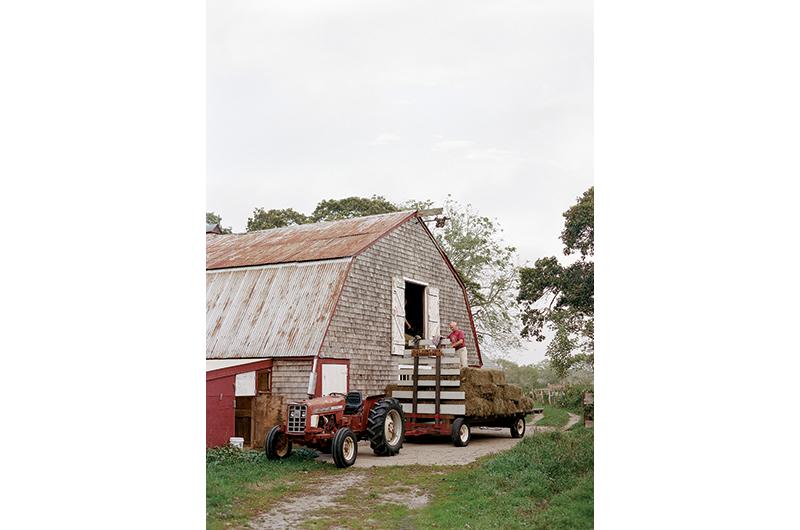
“It’s a real skill,” she said, referring to the high gardening bar set by her grandfather, parents, and Aunt Eleanor. “I’ve realized that I can’t just put seeds in the ground and expect that plants will come up.
“The most important part of my business is I’m doing this on the farm,” she added. “It’s so important to me and to Doug. It’s worth it to stay here and keep it in the family. It makes it worthwhile for my parents and my aunt who have done all this work through the years.”
The young family of four currently lives in a 750-square-foot guest house next door to the house her parents built in the 1980s and just down the road from the original farmhouse. With the boys growing like weeds, they are more than ready for a bit more space. The old farmhouse, meanwhile, is occupied by Emily’s cousin – Eleanor’s daughter – Sarah, her husband Marques Rivers, and their two children, Kayla, fourteen, and Ethan, just three years old. They, too, are making do. But the old house has passed the point of simple improvements.
Emily’s sister Lila and her husband, Nic Turner, who owns Honeysuckle Oyster Company, live in Edgartown, but Lila tends the blueberry and raspberry patches on the farm and is a part of the garden revival plan. Their brother Mason, meanwhile, writes computer code in Charleston, South Carolina, but with the ability to work from just about anywhere he returns to Flat Point Farm for long stretches in the high season. He usually comes for the haying and lives right on the pond’s shore in what the family calls the oyster shack.
Arnie Jr. and his sister Eleanor were happy, therefore, that in June the Martha’s Vineyard Commission (MVC) unanimously approved their plan to break off four new lots and formalize other lots with existing structures in order to begin to create adequate housing for the next generation. The farm is technically a District of Regional Impact under the MVC because of its location on Tisbury Great Pond and its agricultural activities, which means a subdivision of land that might be allowable under town zoning must nonetheless be approved at the regional level.
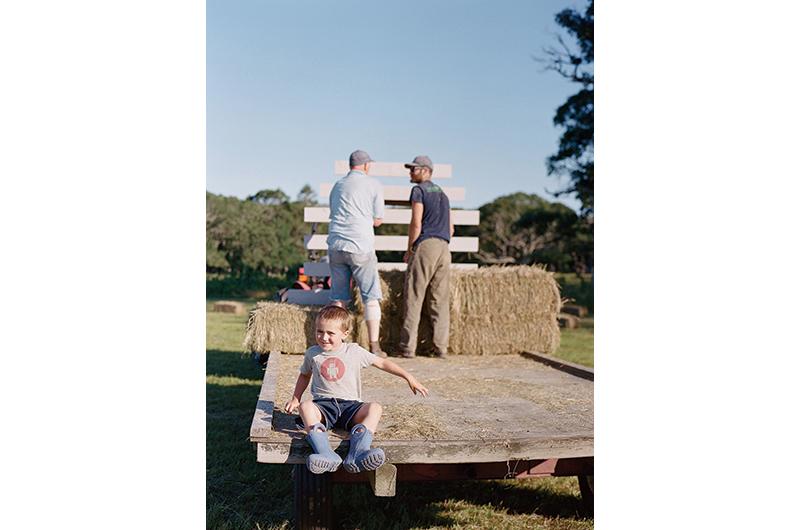
There are many details to be worked out, so it’s back to the town of West Tisbury for permits. Arnie Jr. has two years to submit a Form C Definitive Plan. Still, the Fischers’ blueprint for the farm is less a subdivision proposal than a family’s mapped-out plan to continue to keep most of the land in agricultural conservation while enabling some of the younger Fischers to continue working their grandfather’s farm. The Martha’s Vineyard Land Bank Commission already purchased 12.9 acres of Flat Point in 2013 and placed an agricultural preservation restriction on another 25 acres, allowing for the mile-long public trail encircling the farm. The new plan calls for the land bank to acquire 35 additional acres. Taken in totality, if approved, it means the Fischer family will have conserved more than half of the original 115 acres of farmland.
And so Flat Point Farm survives, which is surreal, really, when you think of how much has changed on the Island since Arnie Sr. walked his dairy cows up Old County Road. With three-quarters of a mile of waterfront and flat acreage surrounding the pond peninsula, it easily could have been chopped into some cul-de-sac advertising “open space.”
Instead the open space is real. The walking trail made possible by the initial land bank acquisition encircles the farm, leading to a broad overlook of the sheep by the water’s edge. The clueless sheep may have the best unobstructed view, but the farm’s careful stewardship has ensured that anyone who chooses to meander down this newly connected trail system can experience the serenity and satisfaction of a farming life well led not just yesterday but today.
And, if all goes well, in the years ahead.

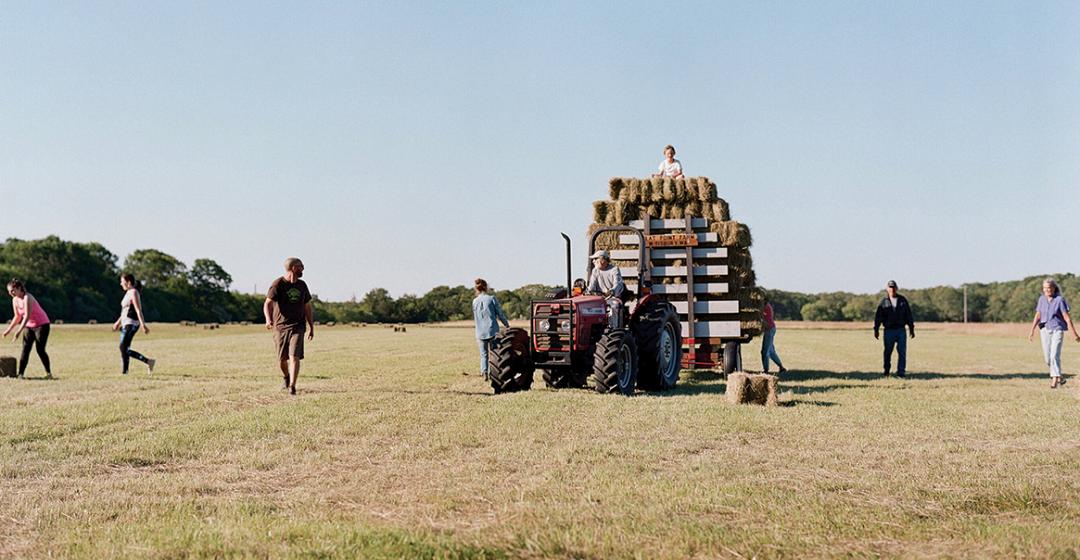


 2 comments
2 comments
Comments (2)